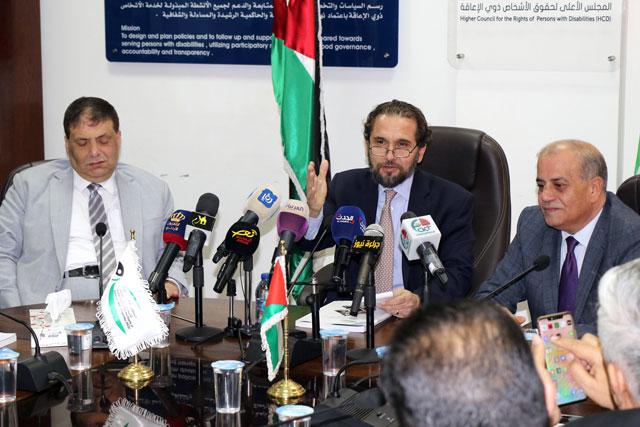You are here
Higher council calls on public entities to take steps in empowering persons with disabilities
By Rana Husseini - Mar 10,2020 - Last updated at Mar 10,2020

HH Prince Mired speaks during a press conference held on Tuesday to announce the findings of an annual report on the status of persons with disabilities in Jordan (Photo courtesy of Higher Council for the Affairs of Persons with Disabilities)
AMMAN — The Higher Council for the Affairs of Persons with Disabilities (HCD) on Tuesday called on relevant ministries and government entities to allocate budgets supporting the rights and needs of persons with disabilities (PwD).
The call came during a press conference held at the HCD headquarters to announce the findings of the First Annual Report on the Status of Persons with Disabilities and Their Rights in Jordan for the year 2018, which was prepared by the council.
On Monday, HH Prince Mired, president of the HCD, delivered the report to Lower House Speaker Atef Tarawneh.
In opening remarks before the announcement of the findings, Prince Mired told the press conference that preparing the report was part of the council's role as an institution tasked with monitoring on the government level. He highlighted the importance of stakeholders adopting the report’s recommendations and developing plans to implement them.
During the conference, HCD Secretary General Muhannad Azzeh pointed to “weak implementation” of a recent law issued in favour of supporting PwD’s rights, stressing the need to follow up on providing special access tools and other facilities that could empower and support PwD, which were included in the law.
“We always hear of good intentions and pledges by government officials, but that is not enough as long as the implementation of the laws remains weak. We need true commitment and a clear timeline to implement the government’s pledges,” Azzeh told reporters.
Some barriers, according to Azzeh, are a lack of instructions to implement the provisions of the laws related to PwD, such as those issuing health insurance cards and granting professional licences to accredited experts specialising in effective communication with persons with disabilities.
“The report also confirms the existence of discriminatory practices, such as the exclusion of persons with disabilities from work or training on the grounds of a disability and the failure to grant persons with disabilities salary increases similar to those obtained by persons without disabilities, as well as lack of laws that penalise people who discriminate against PwD,” Azzeh stated.
“There is still this old mentality that goes back to the 1950s that does not totally believe in the rights of PwD and their roles as full citizens in our society,” the HCD secretary general said.
Azzeh called on civil society to use the report as a tool to “launch campaigns, raise awareness, support PwD and win more supporters for the cause”.
Turning to the issues of physical and sexual abuse against PwD, Azzeh said that society “still lacks the compulsion” to report incidents of abuse.
“The Family Protection Department informed us that there were six cases of sexual abuse and six cases of physical abuse against PwD. We are certain that the numbers are higher but people are afraid to report it because of our cultural barriers,” Azzeh added.
Related Articles
AMMAN — The Ministry of Public Works and Housing, in cooperation with the Higher Council for the Rights of Persons with Disabilities (HCD),
AMMAN — HRH Prince Mired, the president of the Higher Council for the Affairs of Persons with Disabilities (HCD), on Thursday discussed seve
AMMAN — Some 200 employees from the public and the private sector are being trained in ways to effectively communicate with persons with dis















